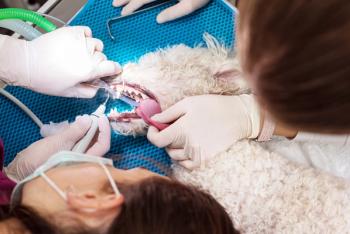
Developing narrative competency in the veterinary field
Find out how to record thorough, accurate medical histories that tell the stories of your pet patients.
Veterinary medicine has a long heritage of story. Today, reflective writing is required for RCVS (Royal College of Veterinary Surgeon) certification in the U.K. Reflective writing is gaining ground in the United States as well, as a component of narrative medicine.
Narrative medicine can strengthen professionalism, cultural competence, bioethical competence, interpersonal communication skills, self-reflective practice and the ability to work in multidisciplinary teams.
In the clinical setting, narrative medicine uses two foundational skillsets that are more commonly used in art and literature: close reading and reflective writing. How does close reading and reflective writing apply to the practice of veterinary medicine?
Consider the way we read a chest radiograph. We systematically assess exposure, positioning, skeletal system, pleural space, heart and vessels, airways and lung parenchyma to make sure we don't miss anything. Presented with the chest radiograph of a dyspneic trauma case, we need to notice not just the absence of pneumothorax that we're looking for, but also the presence of a lytic area on the sixth rib we would never have picked up on otherwise. That's close reading.
We also need to "read" our clients. Just as it can prevent a missed diagnosis, narrative competence in the exam room can prevent the dreaded door-knob moment—the moment when your hand hits the doorknob to leave before the client finally reveals his or her real reason for the visit. Listening closely and attentively, reflecting on what we have and haven't heard, and sharing the resulting understanding of their perspective with clients is just as much medicine as reading their pet's radiograph.
By using the close reading and reflective writing skillsets of narrative medicine, we notice more, describe the situation better, interpret it more accurately, communicate it more effectively and better understand what others are communicating to us.
I recently attended a narrative medicine workshop at Columbia University in New York. In the workshop, we practiced narrative competency skills in several simple exercises, including describing a picture and reading third-year medical students' accounts of their first patient interactions.
Despite diverse backgrounds—we were practitioners, students, educators—we explored others' perspectives so well after these exercises that when challenged to retell another participant's story in that participant's voice, many of us found that the reteller did a better job than we ourselves did.
It's a powerful experience to have someone understand what you said so well they sound more like you than you. With competence in narrative medicine, we can create that experience for ourselves and those with whom we interact, in the clinical and non-clinical setting.
For more information on the Columbia University narrative medicine program, visit
Newsletter
From exam room tips to practice management insights, get trusted veterinary news delivered straight to your inbox—subscribe to dvm360.





